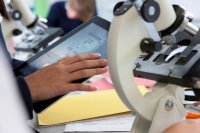The Value of Digital Tools in Science Classes
Digital learning experiences can be used to mirror the work of real scientists, boosting students’ engagement and learning outcomes.
Your content has been saved!
Go to My Saved Content.Educators are increasingly encouraged to update the learning experiences in their classrooms. This includes more attention to STEM learning, such as promoting the integration of technology and science instruction into everyday classroom experiences, and implementing pedagogical frameworks like open-ended inquiry learning and problem-based learning that mirror the work real professionals engage in—frameworks that guide students to “play the whole game at the junior level.”
These considerations are important for guiding students to be ready to take on a highly scientific and technological world. Merely implementing more open-ended science instruction or using applications on laptops or iPads doesn’t necessarily improve student learning, though. It’s how we design and use technology in schools that can truly improve students’ learning outcomes.
Fortunately, the scaffolds and supports within technologies can act in the service of science learning.
Role-Playing as Scientists
Allowing students to get into the shoes of scientists and to mirror the work they do is a powerful technique to get students interested in a science field by offering them opportunities to practice the skills that scientists use on a daily basis. This can increase students’ sense of identity in science, self-efficacy in science work, and general affect toward science.
Digital structures that enable students to step into the shoes of scientists include first-person narratives and role-playing scenarios like the digital learning environment EcoMUVE, which was developed by the Harvard Graduate School of Education. It is a curriculum for middle school students in which they enter a virtual world and must figure out why their local ecosystem is declining. In programs like this, students can play as an avatar and explore an engaging virtual world, talk to scientist non-player characters, use scientific tools, and conduct authentic experiments.
By working through these digital scenarios, students practice science-related skills and processes, ultimately contributing to the transfer of scientific understandings.
Problematizing Learning Tasks
Problematization is a pedagogical technique that makes parts of a learning task problematic in some way, with a goal of increasing students’ problem-solving skills. Problematization is often used to invite students to puzzle over specific processes and ideas. In EcoXPT—a soon-to-be-released program from Harvard—new scientific information is dispensed as the program progresses, meaning that students must rethink their initial hypothesis.
Digital structures that provide this kind of just-in-time information include help buttons and tutorials. During digitally enabled open-ended and problem-based learning scenarios, reminding students about available automated help and tutorial buttons during a confusing part of the work allows them the opportunity to further their understanding at their own learning edge. Tutorials can help explain difficult concepts or tools that students use in these digital learning contexts, ultimately deepening their scientific understandings.
Illustrating Complex Processes
There are many complex processes that students have to reason through in science learning. Oftentimes, these processes are at the heart of the scientific understandings we hope students will gain. For example, consider genetic processes, which can be difficult for students to grasp. Teaching Genetics With Dragons from the Concord Consortium has three programs that offer middle and high school students an engaging way to learn about some of the complex intricacies of genetics in a playful digital learning platform.
This kind of experience aids students as they reason through highly complex and scientific processes.
The Value of Interactivity
A key beneficial aspect of digital learning is interactivity. Technology can also provide many opportunities for students and teachers to collaborate, such as when students are working in larger groups in online peer learning interactions. Numedeon’s Whyville is a great example of an online community where preteen students can create a character, interact with friends online, and participate in science, math, and history activities. Teachers can aid students in thinking about their role in the online community, and how their learning is progressing throughout such online activities.
Teachers play an integral role in these interactions as mentors supporting students in their developing understandings by providing additional support and pushing students to deeper learning.
Aiding Teachers in Assessment
Assessing student understanding in science learning is important for teachers, who must determine where their students are and figure out how to design learning experiences to deepen their knowledge even more. Digital learning contexts allow teachers to build in different types of assessments to periodically assess student understanding. These assessments can be formative and diagnostic, or summative.
These assessments can include typical quizzes or multiple-choice questions that appear in order to assess students’ understanding of scientific content. Digital quizzes allow for quick feedback to students, aiding them in assessing their own learning, which can be particularly helpful in learning complex scientific concepts and processes. Digital quiz results can also be visible to teachers, highlighting student progress and allowing them to see where each student is in their learning without the hassle of paper and pencil grading. Digital assessment may also take the form of a concept map, a medium that allows students to express their understanding visually.
